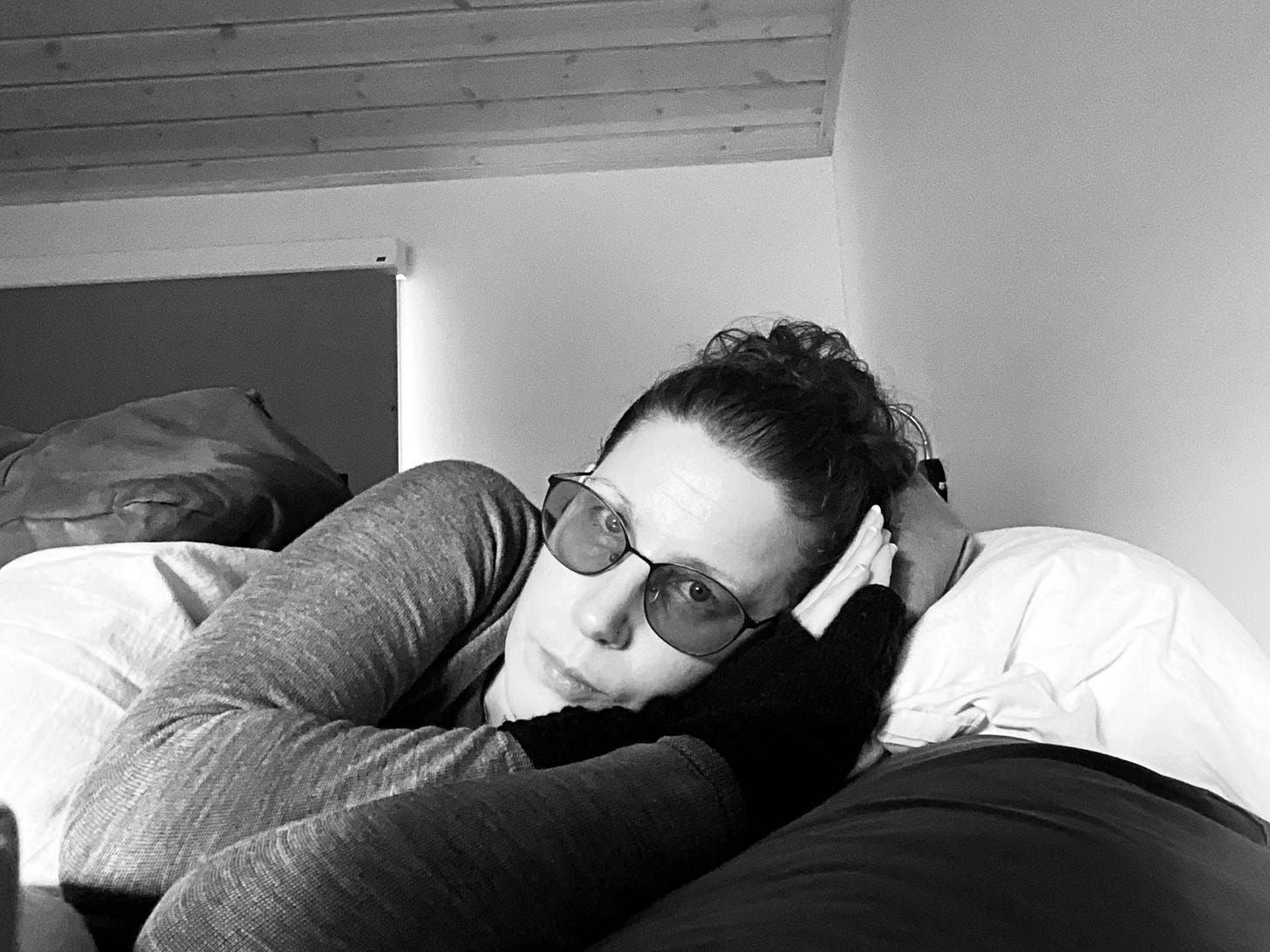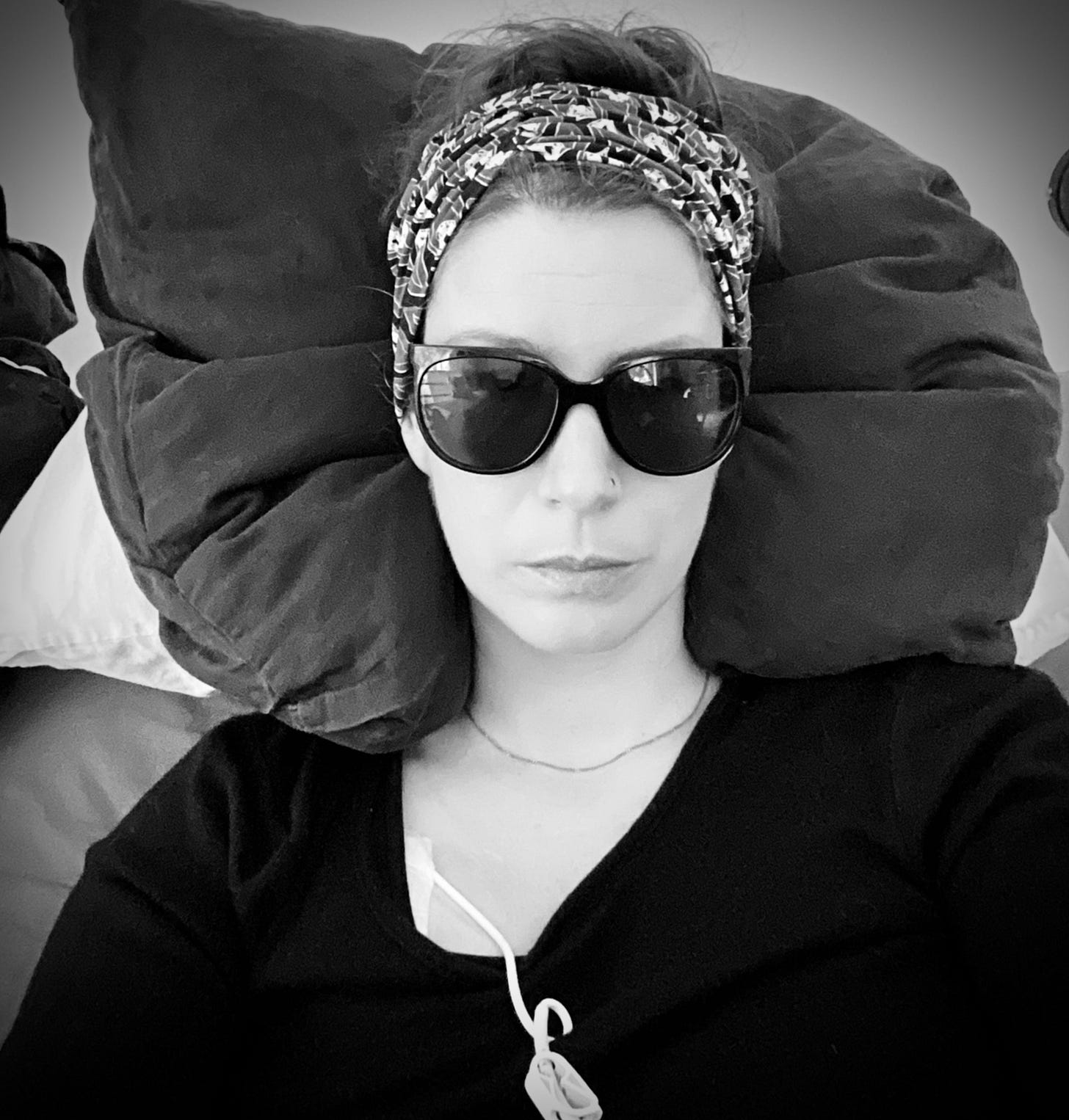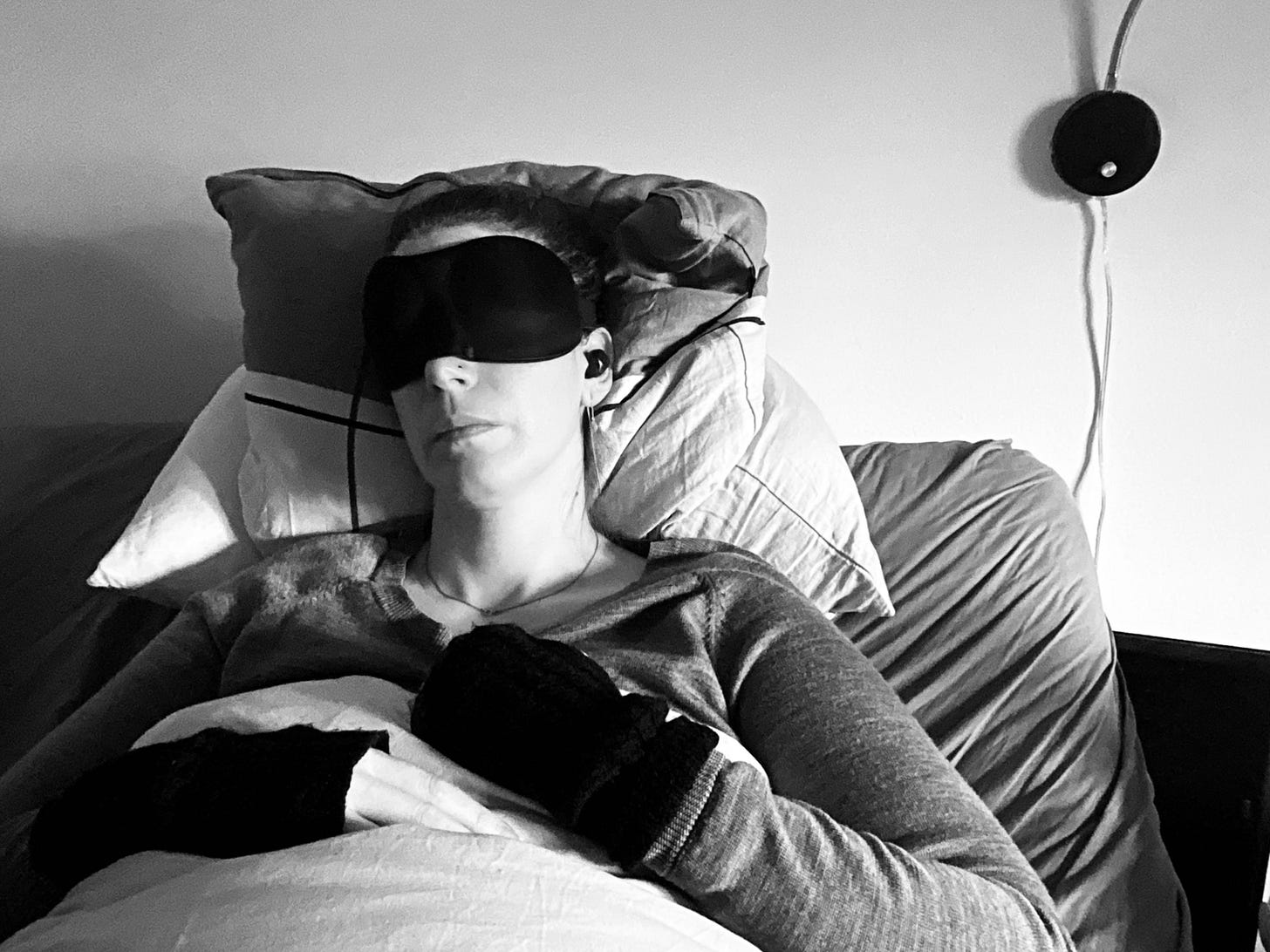What it’s like to live with severe ME
I have lived with ME (also known as ME/CFS) for over twelve years now. In 2017 it turned severe. Here’s what it’s like.
I’ve thought about this post for a long time and whether I should send it out or not. It’s vulnerable to speak of my body in this way, but at the same time I find it important to share what living with an illness that makes you invisible to the world is really like. Most people won’t get to see a person with severe ME, and this is a small window into that life. It’s a long post (it took me a long time to write), I know, and some of you in similar situations to myself won’t be able to read it all, that’s ok, I’ve added pictures if you just want to scroll.
I have lived with ME (also known as ME/CFS) for over twelve years now. In 2017 it turned severe. I haven’t been away from the house since 2019, except for the odd hospital visit here and there, and that involves a gurney and an ambulance. I can be upright for about two minutes in total, which means my feet touch the floor for about ten or fifteen minutes on average a day.
Walking (mostly not)
I can walk roughly 300 steps a day. These steps are often painful, they feel wobbly and even after only taking five steps I yearn to lie down because it feels like my body is turning into lead and gravity forcing it down.
I can walk roughly ten meters in one go, then my muscles give out and I fall to the floor. My lack of energy production, combined with pacing being very difficult and complex, meant my dad would often have to pick me off the floor and carry me onto my electric wheelchair to get me to bed. My muscles have become a bit stronger with medication and my legs have become a tad more stable in the last years so this rarely happens anymore.
Because my body is now stable due to medication and lots of rest, it is easier to pace myself and avoid what we call PEM or Post Exertional Malaise, which is a kind of disease within the disease, where we get serious symptom exacerbation and loss of function after even minimal exertion.
If I have been to the hospital or something else has happened where I become overexerted (at the hospital it’s from sensory input and talking mainly) I will get PEM and even after I recover from the immediate crash, I will need to use my wheelchair for everything. That’s why I hate going to hospitals, amongst other things. Last time it took me a month to be able to go to the bathroom (which is ten steps away from my bed) without my electric wheelchair or dress myself or put toothpaste on my toothbrush. When I came back from the hospital where they had placed me in a busy corridor full of neon lights for six hours, I couldn’t move at all and the paramedics had to lift me into bed when we got home and straighten my legs for me, because I had lost all contact to my muscles and they were so drained of energy there was nothing left in them.
Lack of temperature regulation
As I cannot regulate temperature and get very sick (PEM) if I’m cold, I’m constantly surrounded by hot water bottles and hot cherry pit bags — also in summer. My dad makes a handful of these six times a day and then some. I have an infrared heater by my bed too that helps me regulate my body temperature. Apart from the utter lack of energy, needing external sources of heat is also one thing that keeps me mostly bedbound.
I need help with most things like washing and drying my hair, sometimes putting on clothes, opening stuff, cooking, lifting things, heating cherry pit bags and hot water bottles, and I can’t do any form of housework.
I can come into the dining room for meals where I semi-lie down in a reclined chair, the plate on my stomach and my feet up on chairs pushed underneath the table, as my feet turn blue if I’m upright and I get dizzy and my brain loses oxygen.
In the evening I’m helped onto the coach where my parents and I watch a bit of easy telly (no documentaries or anything with too much talk or information) with the curtains closed and all lights dimmed. We have installed dimmers on most of the lights in the house, because I’m light sensitive. I wear sunglasses because the light from the telly is too much even though I found a way to turn the background light all the way down. In recent years I’ve even gotten well enough to be helped onto the coach for a bit of easy telly in the afternoon — with curtains closed, wearing sunglasses and surrounded by heated cherry pit bags.
Pain
I’m in pain all day. Different kinds of pain. I have neuropathic pains in my feet. This worsens as soon as I use my brain, or if there is too much wind outside, or if I don’t have my hot cherry pit bag directly on my feet.
Then there’s the general pain of exhaustion. Every person with ME, despite the severity, will feel this. This is not something an abled person will ever have felt, even at their most exhausted. This exhaustion is cellular and it feels like every cell is cramping and vibrating and is hungry at the same time.
Then there are the knife pains. They come here and there and are very sudden. They often hit my brain, but can easily hit any area of the body, too.
And the acid pains. This feels like your body and brain are set on fire from the inside. Sometimes the acid even hits my tongue and lips, which I find very odd.
I wouldn’t call this a pain as such but I feel sea-sick most of the time, especially if I’ve overdone something like thinking too much or scrolling on social media or just being too restless.
I am on medication that takes the top off the worst pains and it has taken the constant flu-like feeling, which I really appreciate, because I’ve had periods where the pain was too much and I didn’t feel it was possible to live inside my body. I used to feel like I was poisoned and that I had venom running through my veins and I couldn’t close my eyes because my brain was going haywire with random flashing lights and broken images, but medication has helped to take the top off. I still feel poisoned, but not as much as before.
I don’t remember what it’s like to live in a non-ill body, but when I think about it, if a non-ill person jumped into my body they would get an immediate panic attack and believe they were about to die, because that’s what it feels like — I’ve just gotten used to it somewhat.
The medication I take is in no way a miracle, but takes the top off the worst symptoms. While small, it makes all the difference, because I no longer think about wanting to die to escape all the pain.
Food
I have lots of food intolerances, which makes cooking for me a challenge. I cannot cook or prepare my own food and I can’t eat most take-out or leftovers as it makes me nauseous. I’ve had long periods with no appetite and nausea and could eat only a few spoonfuls of food per meal.
We’ve become big fans of Google docs in our household because I create and/or tweak recipes and then my dad or mom makes that recipe exactly as written. We then try it out and tweak the recipe if necessary. In that way we make food that I too can eat, like dairy free butter chicken, oat milk ice cream, low FODMAP bibimbap, fried rice, miso chicken, teriyaki salmon and portobello mushroom burgers with chili mayo and apple soy glaze. This food greatly increases my quality of life.
The brain and light sensitivity
I’ve written a lot about the brain here and here, but I do want to say that this and the exhaustion is the worst part. I can easily get used to a wheelchair (wheelchairs are awesome), but I can’t use my wheelchair for too long because it requires quite a lot of brain power to drive it. Like I’ve written before, I have periods of a more awake brain where I can write a bit and periods where it’s closed down, but it prevents me from doing in-depth writing (like writing my memoir which I’m stuck with at the moment) or going into deep creative processes, which I love.
My room is darkened by blackout curtains. I have light dimmers on my bedside light and light dimmers in the ceiling, but ceiling light is too much, even turned all the way down. We air out roughly four times a day where I can take in a bit of light and look at the beautiful green scenery outside. My mum has put flowers on a plant ladder and I love looking at all the different flowers. We’ve also planted wildflowers in the garden and in summer the flower blooms are breathtaking.
Entertainment, isolation & boredom
With medication I’ve been able to build up my tolerance to listen to music (the more quiet kind) and I can watch reruns of easy series, especially stuff like The Great British Bake Off or Youtube cooking videos. It passifies my brain and it’s easier for me to stop brain activity when there is something to distract it.
I often put on an easy series on my ipad and lie with my eyes closed or a mask on, with my noise-canceling earphones and the sound low and relax in that way. Other times I put on a guided relaxation to get a deeper rest. I can’t listen to podcasts or audiobooks for some reason though, I think the amount of words produced at a time is too much for my brain. This really isn’t a lot of fun and I deal with both boredom and restlessness that feel very visceral, especially because I’m full of creative ideas and I have to stop myself from thinking too much.
I live with a lot of privilege in that both my parents are (mostly) able-bodied and can still care for me (although it takes a toll) and we have the resources to make things comfortable. I know too many who do not have the resources to make living comfortable or who have adequate care and my heart goes out to all of you.
We’ve built an annex to our house (it’s actually a summer house which we turned into a full time house) where I can stay undisturbed. Before that I lived in the main house and my parents had to cook outside on a small stove because I am too sensitive to smells. My poor parents would stand outside in minus degrees with their winter coats on to cook our food. We used to dread winters because of this.
Living with severe ME (and ME in general) is very isolating and I don’t get a lot of visitors. When I do, I love it, especially because the few friends that do visit are always very good at accepting my limitations and needs (like keeping the curtains closed and not making a fuss about it like doctors often do) and they are good at lowering their energy.
Once in a while my best friend who also has ME (and with whom I chat several times a week) comes to visit me when she can muster up the energy. The first time she came we were both so elated to finally see a friendly face that we couldn’t sleep for days and got PEM. Now, we set a timer when she comes, because it’s very hard to stop.
I’ve also gotten well enough to speak to another best friend of mine on the phone several times a week. We also set a timer to make sure I don’t get over-exerted. I also chat with other ME friends online. These friendships are very meaningful and give me a reason to wake up everyday. I have found that love can keep us alive.
Very severe ME
Severe ME is not the worst it can get — not in any way to diminish my situation, but to send love to those worse off. It can get much worse than this and my heart goes out to all of you. It’s called very severe ME and here people are usually 100% bedbound, have difficulties talking, eating, feeding themselves, they cannot have visitors, may not be able to tolerate any form of touch or light or sound and are in a next level of pain. I’ve had periods where I dipped into very severe ME, but thankfully medication and lots of rest and daily care from my parents got me a bit better. Not everybody reacts well to medication and pacing, so in that sense I feel lucky — but also unlucky at the same time, because I do wish my function, especially my brain, was a bit better, and when it is I’m sure I’ll wish for more.
This is the gist of it. I could write thousands of words more and include a wide array of symptoms (some more annoying than others), challenges and even small joys. This was an easy post to write, although it took me a long time. I’m sure I’ve forgotten something that I’ve gotten used to but is pertinent to ME.
Please do not send me unsolicited advice, it is honestly annoying and patronising, even though I know it comes from a benevolent place (if you’ve sent me unsolicited advice before please know I’m not mad at you, I know it comes from love). I’ve lived with this illness for over a decade and have sought out the best experts in the field to help me. Trust me, I have most likely tried what you suggest, and if I haven’t it’s because I have deemed it inappropriate for my body, mind and circumstances. If I need advice I will ask.
What about you?
What kind of limitations do you live with, if any? Any limitation, whether mental, emotional, sensory or physical, deserves compassion and attention (and is not a competition).
Which of your limitations (if any) can you accept and which are more difficult to accept?








This was a wonderful piece ❤️ resonated a lot - I got diagnosed with chronic uti a few years ago now, and my personal experience with the illness has been incredibly systemic. My main symptoms of the illness are chronic nausea and exhaustion, along with alot of pelvic pain/bladder pain. When I flare I reach extremely high temperatures and my blood pressure drops like crazy so I feel like pure shit. I had 2 straight years where I was entirely bed bound (it’s more housebound now, and it is changing) so a lot of what you’ve discussed I can completely relate too. It was such an avalanche at the age of 21 going from being completely able bodied and young to being so severely unwell I couldn’t get out of bed.
Not being able to work, exercise or see friends absolutely wrecked me and I struggled alot with such intense grief of the life I thought I would have after uni compared to my reality. I’m on long term antibiotic treatment for cUTI which wrecks me in other ways! The comments you made about neuropathic pain I completely relate too - antibiotics have give me neuropathy and it’s exhausting to be in so much pain. Also the food! I’ve had to completely change my diet, there’s so much I can’t eat, the level of attention it requires to monitor your diet in the way it seems we both have too is so emotionally taxing.
It’s all so heavy. Thinking of you ❤️ I think your newsletter is so great, it really is hard to be so vulnerable about your health, especially on the internet. The disclaimer at the end made me chuckle because it is so true. It’s so depressing but you do have to remind people that you have covered all bases, are a complete expert in your illness & body and a herb cleanse or some yoga is not going to make you better.
I was advised by my doctor not to accept an ME diagnosis because, as he put it, 'there's no cure and since you have the mild form there's a chance you'll work again'. He was dismissive of the exercise therapy that is the bulk of the NHS treatment for ME, a stance that I've since learned a lot of people with ME agree with.
He was right on both counts, I do work now, but half of that battle was receiving diagnosis and treatment for my ADHD, which not only improved my quality of life it itself but meant I could actually take care of myself. Even my intolerance of gluten eased after a few years. I thought I had entered remission entirely, but after my first hiking trip (where old ladies both outpaced me and went further than I did) I think I've put myself in PEM. Is there such a thing as true remission for ME or is it just a case of not being in an active flare? I'm not sure.
But I thank you for sharing your experience. It's certainly got me to re-think mine and maybe take steps to rest more and reduce input for a bit whilst I recover. I hope for the best for you, whatever you want for yourself I hope you get it.
Something that stood out to me in particular was how you describe listening to 'easy' TV on low with a mask and shut curtains, because that's what I do now with migraines because my brain needs something to distract itself from the godawful pain or it just shreds itself. Sometimes I hallucinate and at least with the TV on I can control what it is that's stood at the end of my bed. And people just don't get it. 'Well, if you can watch the TV you can do x'. No, you try lying here for ten hours in awful pain for the third day in a row and see how you cope with staring at the wall. Obviously, I'm lucky in that these episodes are infrequent, but I saw myself in your experience and I'm so glad you are talking about it because nobody does and people just don't get it.